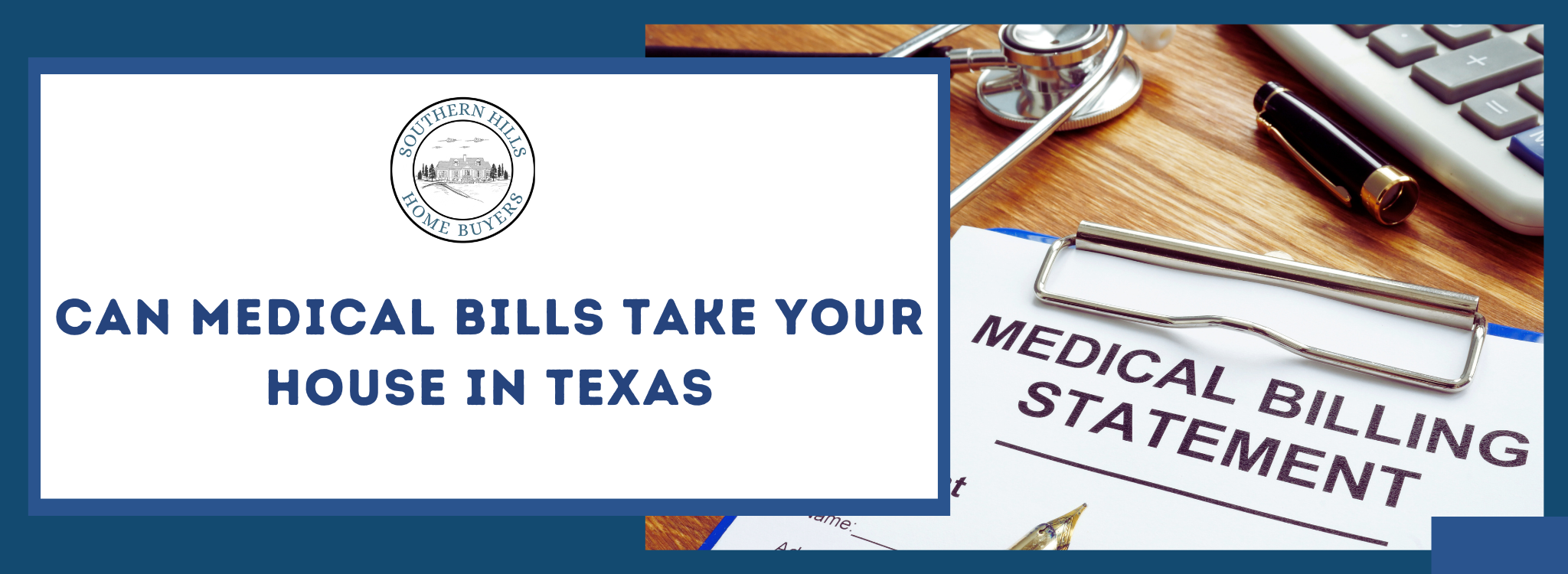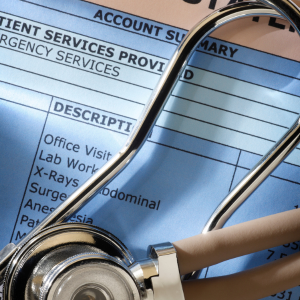
The Importance Of Educating Yourself About Managing And Preventing Medical Debt
Navigating the world of medical debt can be overwhelming and confusing, especially when protecting your home. Understanding Texas’s laws and exemptions, on the other hand, can assist you in managing and preventing medical debt from jeopardizing home ownership.
By becoming familiar with the specific regulations in your state, you can ensure that you take the necessary precautions to protect your property. This includes being aware of potential exemptions that may prevent your home from being seized due to unpaid medical bills.
It is critical to stay informed and proactive when managing and avoiding medical debt, as it can have serious consequences for your financial stability and future homeownership.
Understanding The Impact Of Medical Debt On Your Finances

If you’re a Texan, you know how much of a burden medical debt can be when saving for home insurance. To protect your home from creditors, it is crucial to understand the laws regarding medical debt and property exemptions.
Creditors in Texas cannot seize your principal residence or other protected assets to pay off medical debts because of certain exemptions. These exemptions do not apply to all medical debts due to their limitations.
To safeguard your house and finances, you must be well-versed in the relevant laws and how they affect your unique circumstances.
Examining Wage Garnishment And Writs Of Garnishment Concerning Medical Debt
To protect your home from medical debt in Texas, it’s crucial to understand the laws regarding wage garnishment and writs. Wage garnishment is a legal process in which an employer withholds a portion of a person’s wages to pay off a debt.
Texas has limits on medical debt garnishment, with exemptions for low-income individuals and specific income types. Writs of garnishment, on the other hand, allow creditors to seize funds directly from a person’s bank account or other assets to repay a debt.
However, there are exemptions for primary residences in Texas, which allow you to protect your home from being seized due to medical debt. Understanding these laws can assist those facing medical debt take the necessary precautions to protect their homes and assets.
Alternatives To Losing Your Home Due To High Medical Bills

Many Texas homeowners fear losing their homes because of high medical bills. Texas law offers medical debt and property exemptions, providing alternatives to the current outcome.
Negotiate with healthcare providers for reduced or discounted bills. Another option is to investigate government assistance programs like Medicaid or Medicare.
Additionally, homeowners can consider filing for bankruptcy, which may protect their home through the homestead exemption. Homeowners should know their rights and options for preventing home seizure due to medical debt.
How Bankruptcy Can Be Used As A Last Resort For Managing Medical Bills
Many Texas homeowners view bankruptcy as a last resort when paying their medical bills. Stringent state laws shield people from losing their homes because of medical debt.
These statutes provide for specific property exemptions that can help prevent creditors from seizing an individual’s residence. Nevertheless, declaring bankruptcy might be required if all other avenues have been explored and the debt keeps growing.
People can get relief from crippling medical bills and the threat of losing their homes through this legal process. If you want to protect your home and find financial stability in the face of mounting medical debt, you must be aware of the specific laws and exemptions that apply in Texas.
Protecting Your Assets: Homestead Exemptions In Different States

Knowing the several homestead exemption policies across states is vital for asset protection. Texas has particular legislation addressing medical debt and property exemptions.
These rules let people defend their homestead, their main residence, from being taken by creditors to pay off debt. Although the county and size of the property determine the degree of protection, it generally ranges from $5,000 to $60,000.
These exemptions only cover medical debt; they do not apply to other kinds of debt. Thus, to completely safeguard their assets and prevent possible financial difficulties, Texas homeowners should become familiar with the state’s laws on homestead exemption.
The Role Of Insurance Coverage In Mitigating The Impact Of Medical Debt
Understanding Texas laws and exemptions is critical for protecting your home from the potential impact of medical debt. Insurance coverage is an important factor to consider.
Having comprehensive health insurance can help reduce medical expenses and prevent debt accumulation. In fact, under Texas law, certain types of property are exempt from seizure to repay medical debts if they are insured.
This means that having adequate insurance coverage can protect your health, your home, and other assets from the effects of medical debt. It is critical to thoroughly review and understand your insurance policy to ensure adequate coverage for potential medical expenses.
Seeking Assistance From Non-profit Organizations And Charitable Programs For Medical Debt Relief

Medical debt in Texas can quickly overwhelm homeowners and lead to property loss. However, laws are in place to prevent people from losing their homes due to medical debt.
It is critical for homeowners to understand these laws and the property exemptions that are available to them. Seeking assistance from non-profit organizations and charitable programs can also benefit those dealing with medical debt.
These organizations can offer financial counseling, negotiate with creditors, and provide grants or loans to help homeowners pay off medical debts. By utilizing these resources, homeowners can reduce the burden of medical debt while protecting their homes from creditors’ seizing them.
Knowing Your Rights As A Patient Under Federal Law To Prevent Surprise Bills
As a Texas patient, you should know the state’s medical debt and property exemption laws. Understanding your rights as a patient under federal law is crucial for avoiding unexpected bills.
Federal law protects patients from unexpected medical bills. For example, if you receive emergency care from an out-of-network provider at an in-network facility, you cannot be charged more than you would have paid if the provider had been in-network.
Furthermore, federal law requires healthcare providers to provide patients with a reasonable estimate of costs before providing non-emergency services. Understanding your rights can prevent medical debt from negatively impacting your home and finances.
Proactive Measures: Budgeting, Saving, And Planning For Potential Healthcare Costs

To protect your Texas home from potential medical debt, you should take proactive measures like budgeting, saving, and planning for potential healthcare costs. To prepare for healthcare expenses, setting aside a portion of your income, creating an emergency fund, and researching Texas exemptions is important.
Budgeting and saving for potential healthcare costs ensures you have enough money to pay off medical debt without jeopardizing your home. Furthermore, understanding the exemptions provided by Texas law can assist you in making informed financial decisions and protecting your home from seizure due to unpaid medical bills.
These precautions can protect your home and financial stability from potential medical expenses.
Strategies For Dealing With Medical Debt And Collections Effectively
If you are struggling with medical debt and collections, it is critical to understand the laws and protections available to Texas homeowners. Taking advantage of property exemptions is a key strategy for dealing with medical debt.
These exemptions allow homeowners to protect certain assets, such as their primary residence, from creditor seizure. However, you must be aware of the specific exemptions available in your county and ensure that you meet the eligibility requirements.
Negotiating with creditors and creating a payment plan can help manage medical debt effectively. However, you must also be proactive and informed to protect your home and financial stability while dealing with medical debt.
Understanding The Process Of Sending Medical Debt To Collections

Medical debt can quickly become overwhelming for homeowners, and understanding how to send medical debt to collections is critical for protecting your home under Texas law. If a medical bill goes unpaid, the provider may send it to a collection agency.
These agencies specialize in debt collection and frequently use aggressive tactics to obtain payment. However, in Texas, certain types of property, including your primary residence, are exempt from seizure by creditors.
To ensure that you know your rights and options, you should understand the process of sending medical debt to collections and how it may affect your home.
Exploring Different Options For Paying Off Large Amounts Of Medical Debt
Texas homeowners have multiple options for paying off medical debt while protecting their homes. One option is negotiating with healthcare providers to establish a payment plan or reach an agreement.
This can help to lower the amount owed and make it more manageable. You can also seek financial assistance from government programs or nonprofit organizations that help with medical debt.
Additionally, homeowners may consider filing for bankruptcy, but it is critical to understand the exemptions available under Texas law to protect their property from seizure. Before deciding how to pay off large medical debt and protect your home, you should consider all available options and consult a legal professional.
Medical Bills Vs Mortgage Payments: Prioritizing Your Financial Responsibilities

Knowing Texas law on medical debt and property exemption will help you defend your house. One key factor to consider is how financial obligations—especially mortgage payments and medical bills—are prioritized.
Although both are quite important, knowing which should come first is important to prevent possible fallout, including foreclosure. Texas law states that some exemptions and rules could guard against medical debt causing the seizure of your house.
Variations in these exemptions depend on factors like your home’s equity level and whether you are bankruptcy eligible. Familiarizing yourself with these exemption rules and knowing how they apply to your particular circumstances will help guarantee that you are using your money wisely and protecting your house from loss.
Exploring Options For Managing Overwhelming Medical Bills
Medical debt can quickly become overwhelming, particularly for Texas homeowners concerned about protecting their property. Understanding the laws and exemptions governing medical debt in Texas is critical for homeowners facing this issue.
One option for dealing with overwhelming medical bills is to negotiate with healthcare providers and try to reduce the amount owed. Another option is to apply for financial assistance or charitable care at hospitals and clinics.
Additionally, homeowners may use bankruptcy as a last resort if they cannot pay off their medical debt. It is critical to consider all available options and consult a legal professional to determine the best course for dealing with overwhelming medical bills while protecting your home under Texas laws.
Timely Billing: Why It Matters In Avoiding Surprise Medical Bills

Understanding Texas property exemption laws is critical for protecting your home from medical debt. However, one important consideration that is frequently overlooked is timely billing.
This refers to the timing of sending medical bills to patients and insurance companies. Failure to send bills on time can lead to unexpected medical bills and put homeowners at risk of losing their property.
According to Texas law, medical providers must submit bills within 45 days of the date of service, giving patients enough time to review and dispute any charges if necessary. As a homeowner, you must be aware of your rights and take action if you receive a surprise medical bill that may jeopardize your home’s exemption status.
Taking Control: Negotiating Payment Plans And Settlements For Medical Debt
When faced with medical debt, Texas homeowners may feel overwhelmed and unsure how to protect their properties. However, understanding the state’s medical debt and property exemption laws can give you a sense of control.
In addition to exemptions that protect a home from being seized for medical debt, homeowners can negotiate payment plans and settlements with creditors. This allows them to gain control of their financial situation and possibly reduce the amount owed.
Texas residents can protect their homes and manage their medical debt responsibly if they are proactive and informed about their options.
Navigating Timely Billing To Avoid Unexpected Medical Expenses

Medical bills can be unexpected and overwhelming, especially when protecting your home. Understanding the laws governing medical debt and property exemptions in Texas can be extremely beneficial in terms of timely billing and avoiding surprises.
It is critical to stay on top of your medical bills and track any potential charges that may arise. By taking proactive measures and becoming familiar with the state’s laws, you can protect your home from medical debt collectors.
Communicating openly with your healthcare provider about your payment options and any potential financial assistance programs is also critical. Taking these steps can prevent unexpected medical expenses and protect your home.
How To Handle Surprise Medical Bills: Tips And Tricks
Medical debt can be a significant financial burden, particularly when it occurs unexpectedly. In Texas, laws prevent homeowners from losing their property due to medical debt.
Understanding these laws and exemptions will allow you to handle unexpected medical bills more effectively. One important tip is to thoroughly review your medical bills and question any charges that appear incorrect or unreasonable.
If you cannot afford the full amount, consider negotiating with healthcare providers for reduced fees or payment plans. Furthermore, understanding your rights and exemptions under Texas law can help you keep your home from being seized by creditors for medical debt.
What Happens If You Don’t Pay Medical Bills In Texas?
If you’ve been struggling with medical debt in Texas, you should be aware of the consequences if you can’t pay. Medical debt in Texas can result in a creditor placing a lien on your property, which may lead to foreclosure or asset seizure.
However, important exemptions are in place to prevent certain types of property from being seized for medical debt. To protect your home and other valuable assets, you must first understand these exemptions and how they apply to your situation.
Failure to do so may expose you to financial hardship and loss of property. Understanding the laws governing medical debt and property exemptions in Texas will help you take the necessary steps to protect your home and financial stability.
Can Unpaid Medical Bills Put A Lien On Your House In Texas?
As a Texas homeowner, you must understand the laws governing medical debt and property exemptions. One of the most pressing concerns for many homeowners is whether unpaid medical bills will result in a lien on their property.
Under Texas law, medical providers cannot place a lien on your home for unpaid medical bills. Failure to pay may result in a lawsuit and garnishment of your wages or bank accounts.
Understanding your rights and options when dealing with mounting medical debt is critical to protecting your home from potential legal action.
How To Protect A Home From Medical Bills?
Medical debt can be a major issue for homeowners, particularly in states like Texas, where property is highly valued. On the other hand, understanding the state’s property exemption laws can provide invaluable protection for your home.
Texas law exempts homesteads and personal property, such as furniture and clothing, from seizure to pay medical debts. In addition, homeowners can use legal tools like bankruptcy and judgment liens to protect their homes from medical bill collectors.
By becoming acquainted with the complexities of Texas law and employing these safeguards, you can secure your home and have peace of mind in the face of medical expenses.
Can A Lawsuit Take Your House In Texas?
One of the most pressing concerns for Texas homeowners is the possibility of losing their homes due to a lawsuit. This is especially true for medical debt, where unexpected expenses can quickly accumulate and lead to legal action.
However, it is critical for Lone Star State residents to understand their rights and protections under Texas law. While there is no guarantee that a lawsuit will not result in the loss of your home, some exemptions are in place to protect your property.
You can proactively protect your home from potential medical debt lawsuits by becoming knowledgeable about these exemptions and seeking professional legal advice.
This information applies to Texas and its cities, including Dallas, Fort Worth, Arlington, Spring, Balch Springs, and more. For assistance or questions, please call us at (214) 225-3042. You can also visit our website at Southern Hills Home Buyers for more details.
More Resources To Help You Sell A Home In Texas
| BENEFITS | DEBT COLLECTION | COLLECTION AGENCIES | CONSUMER CREDIT | LIENHOLDER | LOW INCOME |
| POVERTY | NONPROFIT HOSPITALS | UNINSURED | INSURER | TAXES | TAX |
| TAXING | TAXATION | CREDIT SCORE | HOMEOWNER’S INSURANCE | THE UNITED STATES | U.S. |
| GARNISH WAGES | INTEREST | CREDIT REPORTS | CREDIT REPORTING | OVERSIGHT | INJURY |
| INJURIES | FORECLOSING | EXPENDITURES | SUED | SUING | DEBTOR |
| MONEY | MARYLAND | ATTORNEY | EMERGENCIES | CREDIT BUREAUS | CONSUMER |
| CALIFORNIA | MAINE | PERSONAL INJURY CLAIMS | PERSONAL INJURY | PAYCHECK | PROPERTY OWNERSHIP |
| COMPLAINT | REPOSSESSION | REPOSSESSED | STATE AGENCY | FLORIDA | OWNERSHIP EQUITY |
| EMAILS | COURT ORDER | CONSUMER RIGHTS | CONSUMER PROTECTION | STATUTE OF LIMITATIONS | STATUTE |
| REFINANCING | MORTGAGE LOAN | LEGISLATION | INTEREST RATE | INFORMATION | HEALTH CARE PROVIDERS |
| FORGIVENESS | FEARS | FAIR DEBT COLLECTION PRACTICES ACT | EMPLOYEE | ILLNESS | CREDIT CARD |
| COURT | COLLATERAL | A DEBT COLLECTOR | AND DEBT COLLECTORS |


